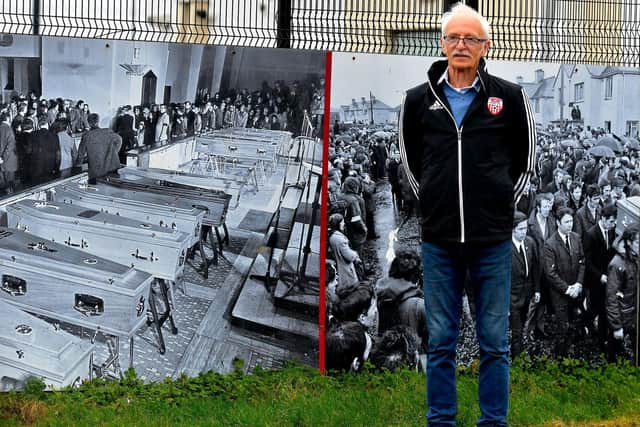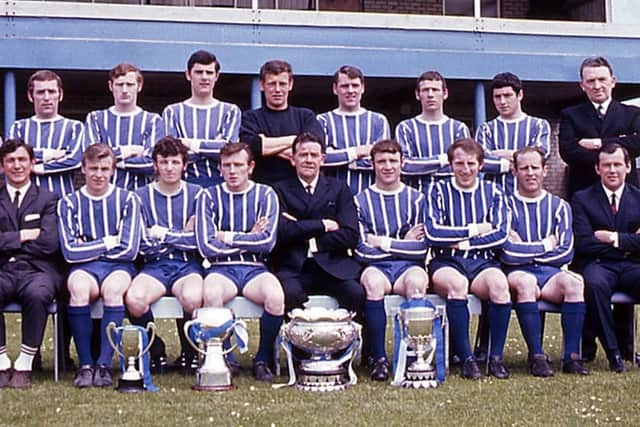Bloody Sunday 50th anniversary: Tony O’Doherty admits absolutely no one foresaw what would happen on Bloody Sunday
and live on Freeview channel 276
The Candy Stripes were forced to play their home games at the Coleraine Showgrounds during the 1971/72 season after the Irish Football Association banned the use of the Brandywell.
The former Northern Ireland international, who played against England and Wales in the space of four days in 1970, also feels that football was, for both him personally and his home town club, becoming irrelevant prior to Bloody Sunday.
Advertisement
Hide AdAdvertisement
Hide AdO’Doherty, who played at Coleraine from 1964 to 1971, making 230 appearances, decided to end his career with the Bannsiders because he felt day-to-day life in the city and the area was more important than kicking a ball about a pitch a few times a week.


“Football was irrelevant and, to be honest, even aside from the horrendous situation of Bloody Sunday, football was becoming irrelevant anyway, but it reached its peak of irrelevancy after Bloody Sunday. Who could even think about football?” asked Doherty.
“It was a horrendous situation and obviously it was something that just added to Derry City’s predicted demise.
“Derry City were being forced to play their home games in Coleraine and the crowds going to Coleraine had dwindled to practically nothing. At that time no one could see where Derry City was going to go, through no fault of their own. To a large extent football was irrelevant somewhat before Bloody Sunday.
Advertisement
Hide AdAdvertisement
Hide Ad“Bloody Sunday, with all its ramifications, did not make football irrelevant as it was already irrelevant. Obviously Bloody Sunday was such a huge event and put everything into perspective and one can only imagine what would have happened if Derry City had still been playing in the Brandywell at that time. Could Derry have continued? I just don’t know, but really in the context of all sports people and footballers in the city, everything just seemed to stop.


“Personally I had walked out on Coleraine about six months before Bloody Sunday because of everything that was happening in this community, I couldn’t see the relevance of playing football at any level.
“The question remains open what would have happened had Derry City still been playing in the Brandywell when Bloody Sunday took place? Could they have continued to play there? I don’t think so. Would they have continued to play? I don’t think so.
“Sport was irrelevant for years, and years and years and the sad thing about that, when we are able to look back on it, is that we lost maybe one or two top talented generations of footballers because they really had nowhere to ply their trade.”
Advertisement
Hide AdAdvertisement
Hide AdThe former Derry player and manager admitted no one foresaw what was going to happen on Bloody Sunday and it wasn’t until later on that evening when the media reported on the horrific events that not just the people of the city but the world saw what had taken place on the streets of Derry.
“Absolutely no one foresaw what would happen on Bloody Sunday,” he admitted. “After Bloody Sunday all sports, from boxing to football, all became irrelevant. To try and tell a young person nowadays that everything just stopped, they wouldn’t believe you. We now live in an age of social media and what people now have to understand, even those on the day at Bloody Sunday, I would say no one understood the significance or the numbers of people dead and injured.
“It started out that one person was shot and then people were talking about rubber bullets and it was only at night time as the world’s media began to broadcast it that the people in this community realised the full extent.”
The 74-year-old feels that it took the city and the region close to a decade to make football and sport in general relevant again after the terrible tragedy which took place on Sunday, January 30th, 1972.
Advertisement
Hide AdAdvertisement
Hide Ad“It wasn’t until the 1980s that football really started to become relevant again,” he added. “It has been well-documented the ‘Gang of Four’ got Derry into the League of Ireland but I have to admit even then there was no great swell about the idea. It was literally us four on our own at the start and it took a while before any public sentiment got behind us, basically because I think they saw it as another case of; ‘the state had taken something else from us and we want it back’.
“We probably struck at an opportune time because I would say around the early 80s is when people started to get a bit of interest again in football.
“However, there wasn’t a huge number of people pushing Eddie (Mahon), Terry (Harkin), Eamonn (McLaughlin) and myself to say, ‘Go and do this’. This was something that Terry came up with and we decided to do it almost on an impulse. We had good friends, people like Eamon Dunphy, Eamonn McCann and Nell McCafferty, who all at that time were journalists and they helped us and with their publicity we slowly started to get support from the public.
“I don’t think sport back in the ‘70s was embedded in the community the way it is now. Football, or indeed boxing or any other sports in this area now wasn’t like that in the ‘70s. You see players now from local clubs doing presentations, you see them going to schools and that certainly didn’t happen in a medium or large scale in the ‘70s. You went on a Saturday to support Derry City and then you came home and that was it.
Advertisement
Hide AdAdvertisement
Hide Ad“It wasn’t the way it is now and in this instance social media is a help because everybody wants to know what players are eating for breakfast, what they are wearing, what boots they wear and all that type of stuff and because of that we sometimes think about Bloody Sunday with ‘today’s head on it’ and you can’t.”